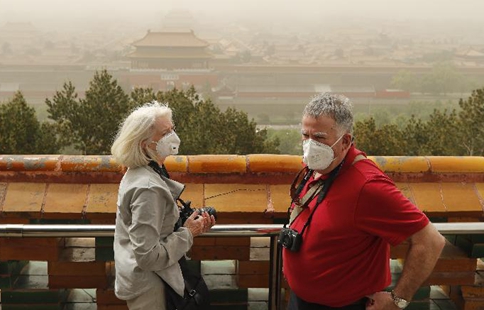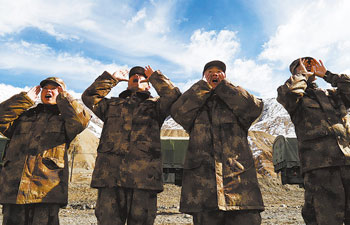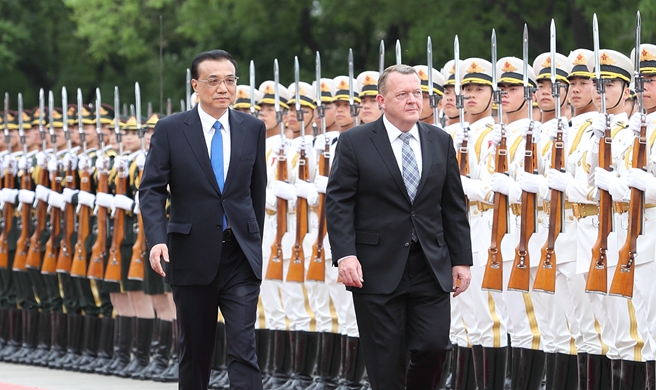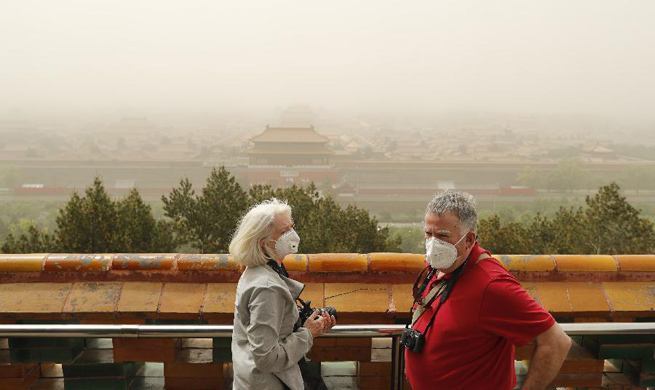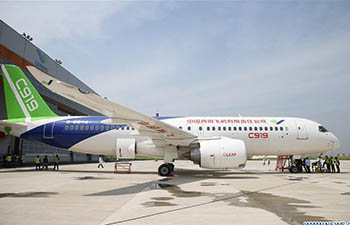ISTANBUL, May 4 (Xinhua) -- As Turkish President Recep Tayyip Erdogan's visit to the United States nears, the chances are almost nil for him to talk Washington into withdrawing its support to the Kurdish militia in Syria, which Ankara fears has territorial ambitions, analysts say.
"(Donald) Trump is unlikely to budge on the issue," Faruk Logoglu, a former diplomat who held top posts in the Turkish Foreign Ministry, told Xinhua, referring to the U.S. president.
Erdogan is scheduled to meet with Trump on May 16, the first face-to-face encounter between them.
Just weeks before the meeting, Turkish jets hit Kurdish militia positions inside Syria and Iraq, sparking criticism and concern from both the U.S. and Russia, which called the strike unacceptable.
Ankara stands zero chance of dissuading Trump from continuing military support to the Kurdish People's Protection Units (YPG), Haldun Solmazturk, chairman of Incek debates with the 21st Century Turkey Institute think tank, told Xinhua.
Noting Washington is so deeply engaged in establishing a Kurdish region, Solmazturk added, "A Kurdish state in the Middle East serves the U.S. interests."
Turkey is concerned that the emergence of an autonomous Kurdish region in its southern neighbor may later evolve into a state ruled by Kurdish militia seen by Ankara as simply a Syrian offshoot of the Kurdistan Workers' Party (PKK), which has been waging an insurgency against Turkey for over 30 years.
Turkish jets dealt early last week a heavy strike against YPG positions in northeastern Syria and PKK positions in northern Iraq. According to the Turkish military, a total of around 70 militants, with about 30 from the YPG, were killed or wounded in the attacks.
Following the strike, U.S. armored vehicles and troops were seen patrolling parts of the YPG-controlled area on the Turkish border. Russian troops in YPG's Afrin canton in northwestern Syria followed suit, according to press reports.
The U.S. and Russian moves are widely seen as a step aimed at deterring further Turkish action against the YPG.
Ankara said, however, it will take further action against the YPG when necessary, voicing frustration about the U.S. siding with the Kurdish militia.
Erdogan vowed that Turkey will never allow the emergence of a YPG state in Syria.
The U.S. sees the YPG as a reliable ground force in the fight against the Islamic State in Syria, and hundreds of U.S. special forces have long been training the Kurdish fighters.
"It was clear right from the beginning that a Kurdish state would emerge. It's Turkey's foreign policy mistakes that led to the current situation," Sait Yilmaz, a security and foreign policy analyst, told Xinhua.
Turkey's ruling Justice and Development Party and Erdogan have long been criticized at home for pursuing a sectarian foreign policy in the region.
Before mending ties last summer with Russia, a staunch supporter of the Syrian government, Turkey joined others in supporting rebel groups in the Syrian civil war, causing the Syrian government to greatly weaken.
Following Turkey's air strike, General Curtis Scaparrotti, the top U.S. military officer in Europe, arrived in Ankara last Friday for talks with Turkish Defense Minister Fikri Isik and Chief of General Staff Hulusi Akar.
According to media reports, Scaparrotti expressed his concern to Akar about the air raids in northern Syria and Iraq, which he said were conducted without proper coordination with the U.S. and the coalition.
The analysts feel that it is Trump rather than Erdogan who would be in a more advantageous position at the bargaining table to persuade the other.
Noting that the commitment to the YPG is Trump's only consistent foreign-policy stand so far, Logoglu feels it is much more likely that the U.S. president would persuade Ankara to change its attitude by a "mixed package of carrot and sticks."
"In Washington, the chances are that President Trump will do the demanding and all the persuading," he remarked.
Solmazturk echoed, saying Turkey is the weaker party at the negotiation table.
Trump has the edge over Erdogan given that Reza Zarrab and Hakan Atilla, deputy general manager of Halkbank, are under arrest in the U.S., noted Solmazturk, a retired Turkish general.
Zarrab, a Turkish citizen of Iranian origin, and Atilla from Turkey's state-owned bank, are being tried in the U.S. for violating sanctions against Iran and money laundering.
Solmazturk feels, like many in Turkey, that Zarrab and Atilla may be used by Trump as a trump card against Erdogan in the upcoming talks.
Zarrab and Halkbank also faced a judicial investigation on similar charges in Turkey following a graft probe in December 2013.
According to reports, Halkbank was involved in money laundering and violation of the sanctions against Iran.
Erdogan recently implied that Zarrab may have been arrested in the U.S. on baseless charges and that he would take up the issue with Trump.
If Ankara and Washington fail to strike a deal over Syria in the presidential meeting, the result would be a serious rupture in relations which Erdogan might find unaffordable, Logoglu argued.
In what can be taken as a response to U.S. criticism about the air strike, Erdogan said Sunday that Ankara was concerned to see U.S. flags together with "YPG rags" in the Kurdish- controlled area.
He cautioned that the Turkish military may again unexpectedly strike the YPG, underlying that reaching a consensus with the U.S. over Syria would not be possible should Washington keep to its attitude.
Ilnur Cevik, a top adviser to Erdogan, even warned that the U.S. troops serving as shelter for the YPG may also be targeted by Turkey.
If the YPG continues to carry out terror attacks in Turkey, then one day a couple of rockets could also accidently hit American armored vehicles patrolling the border, Cevik said Wednesday in an interview on CRI Turk FM, the Turkish branch of China Radio International.
Many advise, however, against any further cross-border military action against the YPG as it would risk a confrontation with both the U.S. and Russia.
It is highly improbable that Turkey will dare to stage a cross-border operation against the YPG from now on, remarked Solmazturk.
Underlining Turkey should not take such a risk either, he warningly added, "Turkey is militarily and politically capable of launching such an operation, but not of successfully finalizing it."
"Turkey is unlikely to launch any further aerial operations that might elicit an American or Russian counter response," stated Lologlu.
In his opinion, Turkey may continue with some cross-border artillery activity against the YPG to save face at home.
The unexpected air strike against the YPG also demonstrated the unpredictability of Erdogan as a leader, some argue.
Yilmaz does not think either that Turkey would conduct further cross-border military action against the YPG as it would bring huge risks to Turkey, but he prefers not to rule out such an option on the grounds that "The Turkish government today is not one which acts rationally."
Following last week's air strike, the YPG fired several mortar shells at Turkish military posts at the border. The Turkish military simply retaliated by returning fire, but did not conduct another air raid.
The analysts feel the air bombings were more aimed for domestic consumption as well as for increasing Turkey's bargaining power with Trump.
Noting the YPG presence along the border is an existential threat to Turkey, Yilmaz said the government hit the YPG with an air operation as it did not dare to launch a ground operation into the area.
"Turkey must carry out a ground operation against the YPG, but I don't think this government would take such a step," he added.
In late March, Ankara halted its military offensive in Syria that was launched in August last year, after the U.S. and Russia blocked its move to take the town of Manbij from the YPG.
The YPG has carved out, with the help of the U.S., three autonomous cantons along the Turkish border during the Syrian civil war, while Washington has established military bases in two in the eastern part of the Euphrates River.
Turkey is particularly concerned that the emergence of an autonomous or independent Kurdish entity along its border may set a precedent for its own nearly 20 million Kurds and encourage Kurdish separatism at home.
Analysts in Turkey have repeatedly said the emergence of a YPG-controlled Kurdish zone along the Turkish border could have been prevented if Ankara had cooperated with the Syrian government instead of supporting rebels in the civil war.
Turkey has so far failed to convince the U.S. of not using the YPG-dominated Syrian Democratic Forces as its partner in the ongoing campaign against the Islamic State stronghold of Raqqa in Syria.
Ankara has stated its readiness to be part of the Raqqa campaign on condition that Washington stops partnering with the YPG.
On Wednesday, Erdogan met with Russian President Vladimir Putin in the Black Sea resort of Sochi, and they reaffirmed that a solution to the crisis in Syria could only be possible through diplomacy.




